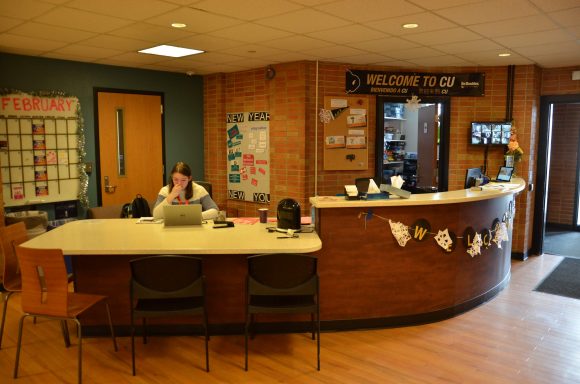
The front desk of Cheyenne Arapaho Hall (Hunter Allen/CU Independent File)
On Tuesday, Feb. 15, advocates for Residential Advisors working at the University of Colorado Boulder called Chancellor Phillip DiStefano to deem them �essential workers,� and demand hazard pay and safer working conditions. An Instagram post from the United Campus Workers Colorado showed how callers could either read from a script sent on a Google document or make a custom message. The script contained two types: one for general callers and the other specifically for RAs.�
The script brimmed with views. More and more advocates visited the page to leave a message, voice their concerns, and advocate for the health and well-being of working CU students. Over 70 call-ins were made that day, which piled up in Philip DiStefano�s voicemail box.
It�s not the first time UCW has helped organize RA unionization for hazard pay. A few months ago, the team implemented a petition to show solidarity with RAs, asking for safer working conditions, job security and an increase in pay during the 2020-2021 academic school year. Hoping to encourage CU Boulder to create a speedy resolution, the survey demonstrated the number of safety concerns within CU Residential Halls as well. Unfortunately, the demands are still roaring, with unions calling for CU to take action and consider options to compensate RAs. CU Boulder has yet to publicly comment on this ongoing issue.
Director of Residence Life Crystal Donnette Lay says there is an �open-door policy for RAs, guidance to perform duty rounds that are safe, and on-call sanitization backpacks available for use.� Lay�s administrative staff took action by providing weekly meetings and �comprehensive staff personal training including safety and crisis sessions covering topics like COVID-19 updates, COVID-19 collective grief workshop, anxiety toolbox for COVID-19, trauma-informed care and emergency response protocol�. A majority of actions involved workshops and sessions in properly handling on-call rounds (or routine hall checkups) with proper sanitation backpacks. RAs have also been given a 500 hundred dollar bonus and a promise for a vaccine.
Even though Residence Life has implemented opportunities to improve RA conditions and have open communication with them, many RAs believe their need for addressing health and safety concerns still hasn�t been met, even after their concerns were voiced during the Board Meeting on Feb. 11, soon followed by the Call-in Day on the 15th. RAs are not allowed to speak to the media which has led to little publicity and contributed to a lack of progress towards meeting demands.
Interestingly, RAs across the country are in the same boat. Cornell University RAs formed a strike, decrying low pay and unsafe working conditions in August of 2020. If demands were not answered, many RAs refused their on-call duties in their respective dorms. Around 50 RAs would skip training sessions and meetings, thus creating a staff shortage. Following frustrating emails and a Twitter post demanding eventual compensation for those who are most impacted, their union echoed cries of the need to have a fair contract, an increase in stipends and open communication.�
As a result, Cornell answered with an increased supply of masks, sanitizers, and thermometers. Safety protocols for residential members and RAs also increased in response to adamant demands at Cornell University. The most advantageous tool for RAs to get what they want seems to be direct action and most effectively � going on strike. RAs at CU Boulder are capable of doing the same thing as RAs from Cornell.
RAs from the University of Iowa, UMich, UPenn, and many others have also demanded hazard pay from their administrations with the help of a workers compensation lawyer. Demands for these universities to implement hazard pay are ongoing in many places, including at CU, as many Residence Life employees remain silent on this issue.�
With a quarter of the semester left, advocating for hazard pay and better safety measures are paramount. With lackluster responses and little care invested into RA health and safety, a collective RA strike should be the next step. In order to have CU comply with demands, it is necessary that CU RAs replicate Cornell�s actions by going on strike.
RAs should stand in solidarity against workplace obligations when they feel the work they are doing is unsafe. Collective action among RAs would force CU to understand the severity of their failure to protect students and student employees in the dorms this past year.
Student activity in residence halls continues to increase the risk of the spread of COVID-19. Boulder County approaches twenty thousand confirmed cases of COVID-19 and CU-affiliated residents have contributed to this number steadily in 2021. This demands further attention to better pay and safety conditions for RAs.�
After time spent cold-calling DiStefano�s office and signing petitions, the next step is a harder push. RAs must strike following outcries for hazard pay and petitions for better safety conditions. Philip DiStefano must recognize the seriousness of RA efforts during the pandemic.
Contact CU Independent Staff Writer Hana Lee at�hana.lee@colorado.edu.
